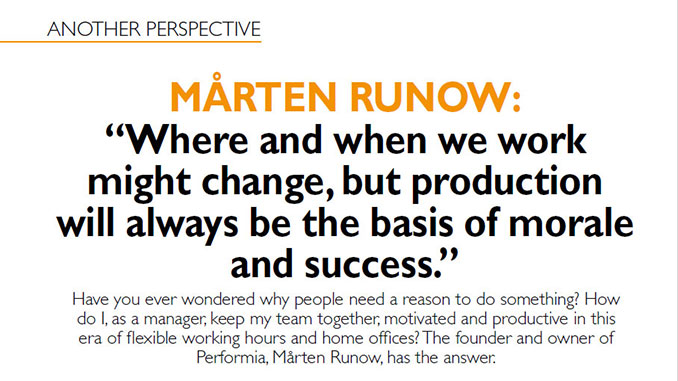
MÅRTEN RUNOW: “Where and when we work might change, but production will always be the basis of morale and success.”
Have you ever wondered why people need a reason to do something? How do I, as a manager, keep my team together, motivated and productive in this era of flexible working hours and home offices? The founder and owner of Performia, Mårten Runow, has the answer.
“There is nothing that brings me more fulfilment, pleasure and pride than when I find effective ways to assist others”, says Mårten Runow about his own motivation in building successful teams. He adds, “And what I like most is helping someone else become more able to help others. In that way, the person I helped becomes more valuable to his environment.”
Making money to ensure your happiness might be tempting but it does not lead to happiness. Mårten Runow emphasizes that those who help others seldom have a problem making and having money. Have you ever experienced helping someone selflessly, and some time later you get a flow back? Whether in the form of money or gratitude or new friends.
WHY DO PEOPLE NEED GOALS?
“The bookstores are bursting with motivational books and the internet is full of quotes on motivation or workshops on how to discover your purpose,” says Mårten Runow. “The truth is that without having to fight for something there is no real happiness. Those who have no goals at all are usually miserable, and those who have set themselves high goals and targets are usually fulfilled and happy.”
Why do people need goals and barriers in order to be happy? According to Mårten Runow, it’s simply because, without any barriers, life becomes tedious and boring. “When you have a goal or purpose that really inspires you, it is like your life is connected to a fully charged “battery” and you do not have the need to force yourself to work, as it happens automatically”.
When you have a goal or purpose that really
inspires you, it is like your life is connected to
a fully charged “batter y”.
The most recent change in the workplace is decentralized home offices. Many companies have allowed staff to work from home fully or partially; this has resulted in shared spaces on a relay basis in the office. If you are one of those people who has experienced working from home, you may ask yourself how and in what way this innovation will affect the motivation of staff and, in particular, teamwork? Has this strengthened or weakened the team?
 MOTIVATION IN THE “HOME OFFICE” ERA
MOTIVATION IN THE “HOME OFFICE” ERA
If you understand the dynamics of a successful team, it should be clear to you that most employees need to be motivated regularly in order to get the required results. How can managers motivate their teams when working from home has become the norm? Only time will tell how they will motivate people.
According to Mårten Runow,
“How productive a person is when working from home depends on the degree to which the individual is able to motivate and manage himself. Some people are easily able to do so while others find it extremely difficult. Thus, you as the manager must understand what it takes to maintain the high productivity of each member of the team when there is no one supervising them. That is why Performia provides advice to clients about staff motivation and how to avoid making costly mistakes.”
According to Mårten Runow, home offices could work, but you need to ensure the following points are taken into consideration:
To build a productive and tight team you need to maintain a high level of communication between the members, and ensure that you provide regular feedback and good coordination despite the physical distance that comes with using home offices.
To maintain productivity levels, the team must be able to get together regularly to exchange ideas and make sure everyone is on board in solving potential problems and in achieving the company targets. Ideally, there should be a mix of live and online meetings.
The most important factor, however, is that your team members are actively in contact with each other and focused on the purpose of the company, so they are well aware of why they do their job.
You as the manager must understand what it takes to maintain
the high productivity of each member of the team when there is
no one supervising them.
THE ERA OF FLEXIBILITY IS HERE
We have already touched on the era of home offices as well as new trends in long-distance work. This new generation of staff want to be in charge of their time, have flexible working hours and, in some cases, want to be “digital nomads”. According to Mårten Runow, companies must be prepared for this trend. However, they should not be too concerned, as long as they keep one condition in mind.
You should not be surprised to know that it is a factor that we at Performia always stress: “In accommodating flexible and decentralised working conditions you will need to make sure that high productivity levels are maintained. That is the fundamental thing. Where we work and when we work must not be allowed to crash productivity.”
MOTIVATING STAFF – MOVING FORWARD
You might imagine that motivating staff in a modern workplace is somewhat different and that your internal PR and communications will have to be suitably adjusted. However, the basic principles remain the same. Mårten Runow advises that managers will need to look for new tools to help them maintain production levels. These tools must assist in getting things done, help to inform people and ensure that everyone knows what is going on in the company. “If the tools don’t make the above happen, then the staff motivation will suffer enormously.”
If the staff has goals and targets, and managers have effective tools, companies will be able to build productive teams, whether the staff is working from home or in different time zones.
However, one question remains. What does one do with a person who is productive, has great potential but isn’t motivated to do anything with it? To what extent can management solve this and to what extent does the solution lie with the individual?
“The real question is if the ones who are really producing want to support those who have no willingness, no energy and no skills. History tells us that it does not work very well, and that is why we advise our clients to demand that their new staff should have demonstrated the willingness to work and get results BEFORE they get hired in your company.”
Always be motivated in what you do, as we believe that makes motivating others so much easier. ■